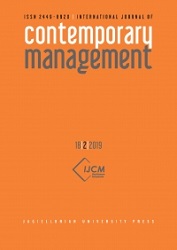Building of the Lodz Brand Based on Cultural Resources – Results of Qualitative Research
Building of the Lodz Brand Based on Cultural Resources – Results of Qualitative Research
Author(s): Wioletta KrawiecSubject(s): Business Economy / Management, Culture and social structure , Rural and urban sociology, Sociology of Culture, Marketing / Advertising, Socio-Economic Research
Published by: Wydawnictwo Uniwersytetu Jagiellońskiego
Keywords: city brand; cultural resources; grounded theory; cultural institutions;
Summary/Abstract: Background. The city’s brand has a particularly complex and multidimensional structure. Its identity is a key component, and it is the basis for building the city’s image. Increasingly, resources from cultural and creative industries form the foundation of this image. It should be mentioned that an important role in the process of building the city’s image is assigned to a creative person with the ability to recognise opportunities and threats in the future and to flexibly adapt to changes in the environment. Research aims. The article presents the potential found in cultural resources of the city of Lodz in the process of building the city’s brand. It also shows the extent in which they are used or omitted, perhaps by the insufficient professional experience of cultural managers. The article also describes the profile of the manager of cultural institutions. Methodology. Interviews with managers and employees of cultural institutions in Lodz constitute an empirical basis of the research. The data analysis was carried out following the principles of the grounded theory methodology. Key findings. Lodz has a sufficient spectrum of cultural resources which have an impact on building the city’s brand. The main ones are those that are included in the urban space and those that are created by cultural institutions in the proposed “cultural offer”. Lodz should not lose its flagship events, as they contribute the most to attracting people into the city and its brand. Lodz represents a post-industrial character, new openness, and creativity in action. It also has neglected areas, such as the weakened film industry, the neglected history of the textile industry, underfunded cultural institutions, or limited relations with local governments. The managers in question perceive the city’s resources as a potential, although this does not mean that they can use them effectively in the city’s brand building process. Their professional development probably allows them to see opportunities and threats of the environment and helps in making decisions. However, this subject needs more in-depth research.
Journal: International Journal of Contemporary Management
- Issue Year: 18/2019
- Issue No: 2
- Page Range: 7-25
- Page Count: 19
- Language: English

